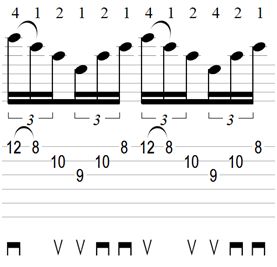By Tom Hess
Wish you knew why some musicians become massively successful (and how you can too)? Hint: It’s not by simply copying the actions of others in the industry – it’s by developing a success-oriented mindset as the foundation of your actions. Once you have the right ‘mindset’, everything else will fall into place in your music career and you will achieve success.
For the rest of this article I will assume that you have a great understanding of what you want to accomplish in your music career (if you don’t yet, stop reading right now and check out this article about how to plan a music career). To help you understand how you can achieve the greatest success in your music career, I am now going to compare the way ‘unsuccessful’ musicians think versus how ‘successful’ musicians think. By understanding the difference between the two, you will be able to reach your music career goals much faster.
Have Intense, Unbreakable Focus
Highly successful professional musicians make sure that everything they do works in congruence with their major goals. They have an intense focus on their goals and do not spend ‘any’ extra time, money or energy on things that will not help them achieve them. For instance, if your main goal was to release a solo album on your own, you will need to invest your time into writing and recording rather than simultaneously searching for a band or get local gigs.
Musicians who struggle to achieve success believe in the ‘common sense’ advice of ‘don’t put all your eggs in one basket’ when it comes to their music careers. Because of this, they end up spreading themselves too thin and fail to achieve any ‘big’ results in anything they do. Truth is, becoming successful requires being the very best at whatever you do – this only happens once you line up all your thoughts, beliefs and actions to focus toward the achievement of a single goal.
An additional aspect of ‘being congruent’ is staying true to your deepest desires when it comes to your music career. If your true desire is to tour in a big band but you settle for a job as a session musician because it feels ‘safer’, you will have a very hard time lining up all your thoughts, beliefs and actions to focus on that which is not what you truly want.
How can you apply this information into your own music career? The easiest way is to ask yourself the following question: “How do my current actions help me reach and accomplish my greatest music career goals?” If you are unclear about this, you are likely on the wrong road with the actions you are taking and need to learn more about how to reach your goal. On top of that, even if you ‘are’ taking actions that can help you accomplish your ultimate goals, they will often have little effect until you understand how to fully integrate them into an effective music business strategy.
Additionally, some of the actions you take might seem entirely unrelated to your main goals when they are actually completely related to them. For instance, many musicians who want to tour the world in a band refuse teaching music for a living, thinking that this will keep them from achieving their goal. However, the truth is teaching music is the quickest, most stable and flexible way to earn a living as a musician while working on other activities in your music career (such as going on tour – something you could never do working a regular full time job).
To summarize, it is just as ‘crucial’ for you to understand how an action will help you build your music career as it is to actually do it. Test yourself now to see if you are prepared to become a highly successful pro musician survey.
Eliminate “Zero-Sum” Thinking From Your Mental Vocabulary
All highly successful musicians think, believe and act on the following two premises:
#1. It is not ‘wrong’ or unethical for a musician to desire to earn as much money as they can from what they do. Until you agree entirely with this idea, NO music company will want to work together with you to help you build your music career. Why? Because all companies in the music industry exist for one reason and one reason only: ‘to make a lot of money’. Music companies would never invest tons of money into a musician who thinks that money is the root of all evil and has no intention to help the company earn their investment back tenfold. It is for this reason that the industry is called the music ‘business’ and not music ‘donation’. Caution: Even if you think you can fool a music company into working with you while at the same time not wanting to help them earn money, they WILL know. Companies can ‘sense’ this in you way before you even realize it. This is just another strong reason why you must be congruent in your beliefs as I mentioned above.
#2. The world is filled with opportunity and you can achieve unlimited success for yourself and those associated with you by using a win/win mindset and forming mutually beneficial partnerships.
These two mental approaches are fundamental for getting musicians to take the correct actions to achieve their goals and become highly successful.
On the other side of things, unsuccessful musicians think with an opposing mindset to these two approaches. They believe that the amount of money available for everyone is limited and when someone becomes wealthy, it reduces opportunities for everyone else. In addition to these ideas being completely unproven, this style of thinking creates a mindset of ‘scarcity’ that leads musicians to think with in terms of ‘lose-lose’. No one in the music industry will want to work with someone who thinks like this.
This is a huge part of why it is ineffective to copy the tactics of other musicians. In addition to needing a complete, overall ‘strategy’, if you as missing the right belief system to make the foundation of the actions you take, you will never get the results you could in your music career.
Get Rid Of The Entitlement Mentality
Unsuccessful musicians assume that they need to beg people in the music industry for ‘a chance’ to get their big break (by sending off promo packs or demos for example). Whenever this doesn’t work, they complain that there is simply ‘too much competition’ and that making it in the music business is only for those who are privileged.
In contrast, people who go on to build successful music careers do not sit around waiting for someone to give them an opportunity just because they have written music or can play an instrument well. They are fully aware that they must ‘earn’ their success.
To do this, they must:
1. Understand exactly what the music company they intend to work with needs as well as what major goals the company has. Learn more about this by completing this short music career success assessment.
2. Create a well thought out plan for how they will meet the other side’s needs.
3. Make the other side ‘fully aware’ of the fact that working with them will bring great benefit for everyone involved.
4. Follow through completely to generate value for the other side and develop a reputation for being highly loyal, reliable and dependable.
Any musician who follows these four steps will put themselves at the head of the line in front of the other 99.9% of musicians. To learn how you can make your own opportunities and succeed in the music industry.
Be Able To Tell The Difference Between A ‘Strategy’ Versus A ‘Tactic’
Before you can hope to achieve any success with a career in music, you need to determine your medium and long-term goals. For instance, you may want to obtain a recording contract, get accepted into a great band, go on an international tour or gain the freedom to write your own songs without worrying about lacking the money to make ends meet. In order to accomplish these goals, you must develop an effectively organized combination of tactics that work as the glue to hold together an overall strategy.
A ‘tactic’ is an action you take that achieves a specific result in the short-term. Examples of this include: playing a show, trying to get your album reviewed or creating a new website for your band. Any single action you make is a tactic.
On the other hand, a ‘strategy’ generally means combining together many tactics as part of an entire system with the goal of reaching a longer term goal.
To illustrate the difference between the two ideas, think of this analogy: In football, a tactic could be making up a specific play while on offense or defense. A strategy would be understanding how that specific play ties into the big picture when it comes to beating the other team’s weaknesses in order to win. This means understanding how the play relates to the other plays you made before and the ones you will make afterwards to win the game.
Musicians who do not achieve success ‘only’ think with a mindset based around tactics. A lot of these musicians really try to ‘take action’ to move their careers forward, but struggle to make any progress because their actions are not part of an overall strategy. This is exactly why merely copying others does not help you achieve success (you are only copying the tactics without knowing the real strategy they are a part of).
Truth is, most musicians are not good at creating effective strategies to advance their careers (just like me when I first began). Because of this, it is essential to locate a mentor who will help you design a strategy to reach your music career goals.
Only Associate With People Who Will Help You Succeed
Everyone who is successful in the music industry is highly selective of who they invest time, money and energy into. You must also take on this trait if you wish to build a successful music career.
Here is a basic example that demonstrates how you can potential ruin your music career by associating with the wrong people:
In most cases, people who form bands (and desire to make it big someday) rarely consider anything about each band member other than musical skill. No one ever talks about each other’s long term goals, forms a strategy together or discusses a specific business plan for how the band will make money and advance in the industry. No one in these bands offers any real value to a music company, making the likeliness of the band becoming successful close to zero. These types of bands usually do not stay together for more than a couple of months.
Musicians who succeed know that there is much more to consider than musical skill alone. They look to find musicians who have the ‘complete package’ in terms of their mindset (made from the principles discussed in this article). To find out how to locate the right band members, study this free musician’s resource about how to find the best band members.
No matter what you plan on doing in the music industry, you must put together a network of success-minded musicians and business partners who will help you build your career just as you will help them. These people must be more than just ‘great musicians’. The must have all the same pieces of the puzzle as successful musicians.
After training and mentoring many musicians in my Music Careers Mentoring Program, I have truly seen the incredible value of building a network full of success-minded musicians who help each other earn money in their music careers, have joined bands together and toured internationally and constructed business relationships based on the principles of this article.
Now that you know the biggest differences between the mindsets of successful and unsuccessful musicians, you understand why only a handful of musicians ever ‘makes it’ in music. When it comes to developing your music career, your mindset will either be your strongest friend or your toughest enemy and you must learn how to make it work in your favor. After you develop the same mindset as professional musicians, you will achieve one hundred times more in your music career than you would have otherwise.
Complete this mini course on how to succeed in the music business to effectively apply all the concepts in this article into your music career right away.
About The Author:
Tom Hess is an electric guitar teacher and musician success coach. As a professional music career coach, he works with musicians around the globe to help them learn how to build a career in music. Find out more by checking out this free music career assessment and reading these free music career building articles.



